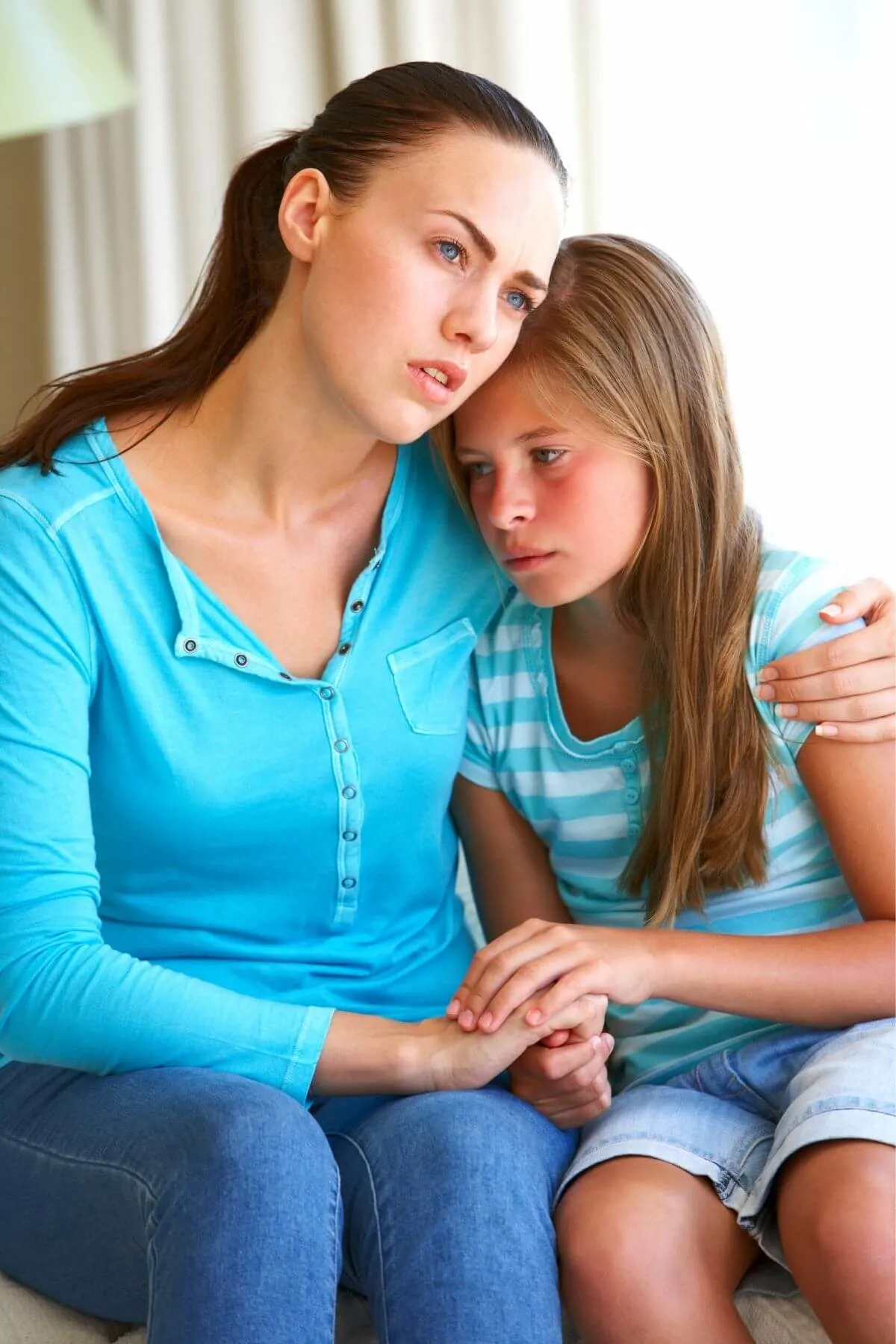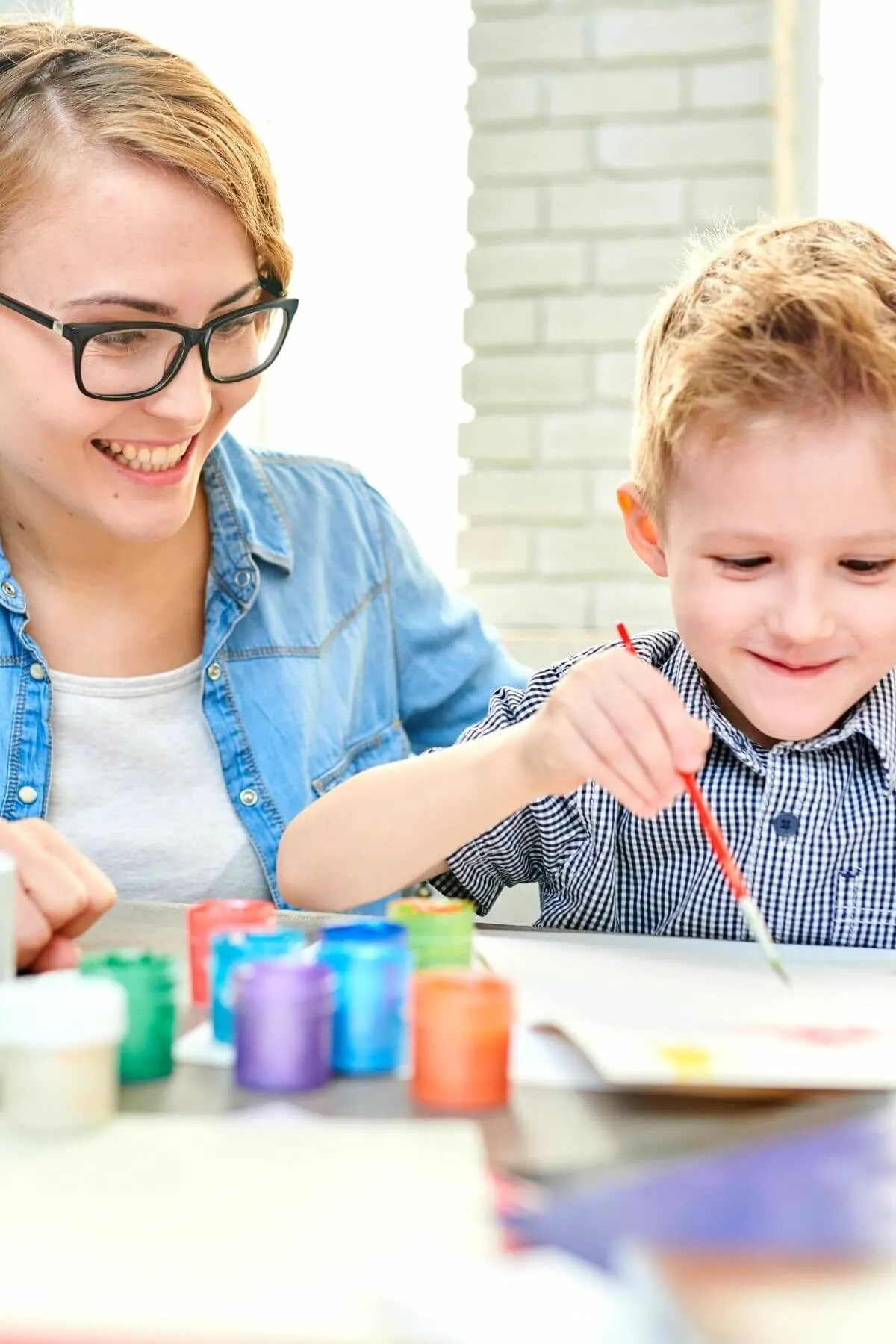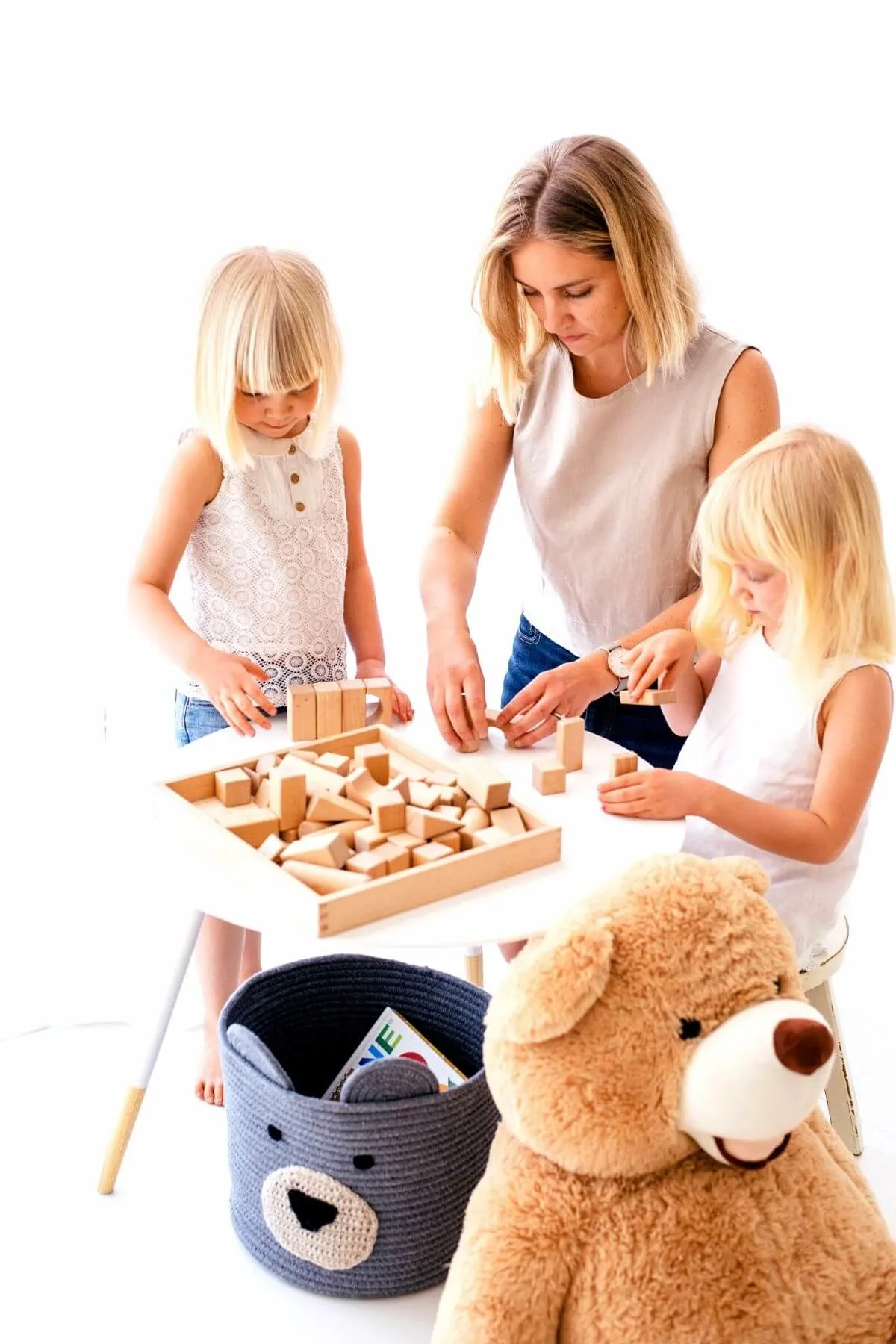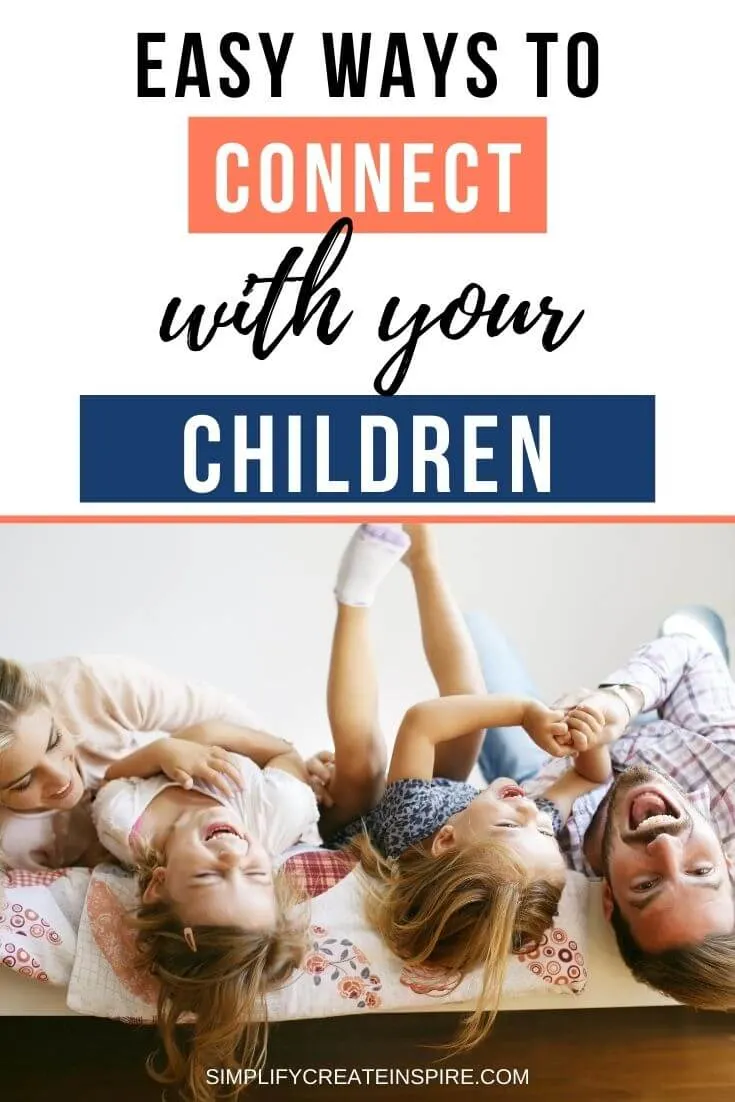The bond between parents and children is one that lasts a lifetime. This bond can often become the driving force behind many of the important decisions we make in life, from choosing career paths to developing problem-solving skills and resilience. Knowing how to connect with your child will help you to form a healthy bond with them and create a happier home for the whole family.
These strategies will help you improve your connection with your kids.

The Importance Of Connecting With Your Child
Children need an emotional connection just as much as their parents do. It is essential for healthy child development.
Parents who are able to form a strong emotional connection with their kids will find themselves with cooperative kids who are more willing to follow rules set by their parents because they know the importance of boundaries and the fact they are there to keep the child safe, rather than make their life more challenging.
Children crave the security and stability that a parent can provide them- they want to be able to depend on their parents.
The more we are able to connect with our children, the happier and more fulfilled they will feel in any given situation.
The first step is recognising how important this connection really is.
It can help encourage a child into forming healthy relationships with others outside of their family too and support them towards a future filled with supportive, positive relationships.
Conversation starters for families can be helpful to get kids talking. Try these conversation starters for kids, teens, and couples, conversation starters for family dinner & Would You Rather questions for kids to get everyone talking!
The Magic Relationship Ratio
The Magic Relationship Ratio is a study completed by parenting experts Dr Gottman and Robert Levenson about happy versus unhappy marriages, and these same concepts can apply to all types of relationships.
It essentially means positive interactions need to outweigh negative interactions on a 5:1 scale.
To keep our relationship healthy with our children, every negative interaction needs to have five positive interactions.
Negative interactions include scolding, nagging, yelling, criticizing, reminding, and correcting. So, it’s important to have five times as many positive interactions to build a connection with your child.
The following parenting strategies are simple ways that can help you connect with your kids and strengthen your bond together!
Communication Skills To Improve Connection
There is nothing more important than communication when it comes to strengthening a bond with a child, a partner, a friend or a coworker. It doesn’t matter who the person is, communication is key and these tips for communicating with your children will help you to connect easier:

Open-Ended Questions: Asking your child questions that require more than one-word answers to develop a conversation are a great way to explore what they feel, their experiences and learn their opinions.
Active Listening: Actively listening when your child is talking is an essential way of letting them know you hear what they’re saying! Listening means being fully present, not multi-tasking, so put your phone away, pause what you are doing if you are able to or ask your child to wait a moment until you can give them your full attention.
Listen Without Interruption: Take the time to listen without interrupting with eye contact. Your child needs to know you value what they have to say and not every conversation requires your input or advice. This is again where active listening is essential.
Build Them Up: Let your children know that you are proud of how hard they work and what they accomplish. One way is by telling them before bedtime each night about something they accomplished that day that made you proud. It can be as simple as telling them you appreciate seeing their smile each day.
If you’ve had a bad day together and are struggling to come up with a positive behaviour from this day, instead focus on a positive trait your child has, even if it did not show today.
For example, “It makes me so proud when you are kind to your little brother. You are his role model and are very important to him”.
This reminds your child how their good behaviour is far more positively received than their negative behaviours.
Allow Them to Know You: Share your personal story and experiences to allow your kids to know you as a unique individual and not just as ‘mum’ or ‘dad’. They don’t know your history unless you tell them and through knowing you better, you have a greater chance of becoming friends as well as family.

Be Vulnerable And Open: If you’ve had a hard day, be willing to talk about it with your child (it doesn’t matter how old they are). Children will often want to know what’s going on in their parent’s world and this is the perfect opportunity for you to connect in your parent-child relationship!
They may also be able to provide a unique perspective on the situation that you alone may not consider. Kids have a wonderful way of seeing the world differently from us grown-ups.
Face Their Fears: Pay attention to your child’s fears and offer them positive words and gestures. If your kid has a difficult task to face, offer them encouragement and take the time to understand why they are nervous or fearful of the situation.
This is a perfect opportunity for sharing an experience you’ve had where you faced a fearful situation and the outcome was positive. Remind them it’s okay to be scared though!
Encourage Goal Setting: Talk to your child about their goals and desires. Knowing what is in their heart is essential for connecting with your child. Goal setting for kids is such an important skill and often underestimated. It tells your child you have faith in their ability to achieve their goals but also helps them develop valuable life skills for their future.
Meet Them Where They Are: Instead of expecting your child to change their mood or behaviours to suit yours, find a way that you can fit with them in that moment. If they are feeling playful, be playful back.
If they are moody or angry, find a way to let them express themselves in a healthy way. Maybe that means physical activity to work away the emotions or giving them some time to cool down without getting in their space.
Routines To Help Connect With Kids
There are many routines we can introduce into our family home that encourage positive relationships with each member of the household. These routines bring stability, structure and comfort.
Here are some ideas for routines that can help you develop a strong bond with your children at home:
Family Meal Time: Eat meals together and make family mealtime a routine you share together. Even just the act of eating together is a great way to connect as a family, however, you can add to the experience by each sharing about your day. We often go around the table and each share the best thing from our day.
Create A Morning Routine: Have a special moment with your child each morning. These moments don’t mean you have to talk. It’s enough to snuggle them or start their day with a wake-up song, like the author of The Happiness Project, Gretchen Rubin did with her child.
Our youngest would always come to me for a morning snuggle and it was by far my favourite way to start the day and I know it helped her start her day on a positive as well.
Memory Making: Create memories with them by taking annual or more regular trips together or creating traditions at home that are uniquely yours!
Bedtime Routine: Create a bedtime routine that you stick to. For younger kids, reading a book together, followed by a chat about the story or anything else your child wants to talk about and of course, wishing them goodnight, as you tuck them in with a hug, are lovely ideas.
For older kids or teenagers, your routine may be popping by their room for a hug and a warm smile to wish them goodnight or stay for a few minutes to chat. They may feel like they are getting too old for this routine, but it is a great reminder of how loved they are.
Routines also help individuals to feel secure in their environment, which is essential when they are going through those hormonal teenage years, just as much as when they are throwing toddler tantrums!
Showing Affection
How important is affection in developing a healthy parent-child relationship? A UCLA study from 2013 found that unconditional love and affection from a parent can make children emotionally happier and much less anxious.
These simple strategies can help you add more affection to your day-to-day family life:

Give Your Child A Hug: This one doesn’t need any explanation, right? It will make both of you feel better and it’s good for the soul!
Smile At Them Often: Studies show that children who feel their parents are proud of them will try harder in school and other activities because it feels good to be appreciated! This is a great way to build self-esteem too. And you may be surprised how many more smiles you can fit into your day!
Lunch Box Notes: Leave your kids notes in their lunchbox, notebook, or stationary case. It will bring a smile to their face and make their day. Lunch box notes are a beautiful way of giving affection when you are not together.
Regular Affection: Giving affection throughout the day does not all need to be hugs and kisses. Affection is kind words, smiles, a hand on your child’s shoulder when waiting in line or a gentle rub of their back as they are getting ready to sleep.
Find more activities to do at home with kids plus over 100 fun ideas for the backyard too!
Quality Time For Connection
Many acts of defiance we see from children can be related to them seeking attention and approval from you. Not always, however, these quality time activities and habits will help ensure your child feels seen and like they are a central focus in your life:

Share Interests: Find common ground where both of you can have fun and make memories together. Finding a shared hobby or interest that you can do together is a wonderful way to connect with kids. If your children are interested in a new hobby, encourage them.
If they want to join an after-school activity or take up a new sport, go along for the ride! Be their biggest cheerleader.
Spend Time Together: We all try to get things done as quickly and efficiently as possible, but a simple card game, board game or a game of “I spy” or reading their favourite book can be really powerful in fostering that connection. You don’t need much time. It doesn’t matter if you only have 2 minutes to fit something in, take those 2 minutes and make them count!
Time together can even be having your child help you cook dinner or go out for a parent-child outing.
Be Silly Together: You might get looks of horror from your tween when you start dancing around the kitchen at dinner time or cracking cheesy jokes, but being able to have fun helps to create a happy household and these brief moments of joy can have a huge impact overall. There is no greater sound than a child laughing!
Play Together: When kids are playing games on screens or tablets they often lose touch with how much fun they can have with others so encourage opportunities to play together. Get down on their level if you can and build LEGO or learn how to play the computer games with them.

Family Game Nights: Whether you’re playing a classic board game like Monopoly or Jenga, making up your own rules as you go along, or are just trying to think of words that start with an A and end with an E, a regular family game night is a wonderful tradition to start together.
It doesn’t matter what the games are so long as you can laugh and enjoy each other’s company.
Have A Dance Party: Turn on your favourite music and take turns picking songs that you both like. It’s fun to see how each child has different tastes in what they enjoy dancing to! We love introducing our kids to our favourite songs from when we were growing up and having a laugh at how different music is compared to now.
Take A Walk In Nature: Walking through beautiful surroundings is always beneficial for your mental wellbeing, as well it just being enjoyable to spend time with your kids! It’s an easy way to make sure they get enough exercise too as a healthy lifestyle helps with healthy mental wellbeing too.
You might also like to check out these ideas for solo parent time, with mother-daugther day ideas and father-daughter day ideas to connect with just one child during one-on-one time.
RELATED READING: Tech-Free Family Activities For Home
More Strategies For Connecting With Your Children
These final few strategies are also helpful in creating a harmonious household and a stronger connection between family members:
Be A Role Model: Be a good role model and demonstrate your personal values through what you do in day to day life. Show your child how to feel confident by modelling the behaviours yourself. They will see that you are proud of who you are and that they should be too!
Encourage Independence: Set aside time for your child to be independent and explore new things. They need the freedom to explore who they are and what interests them in order to become confident and more resilient individuals.

Rules Are Essential: Maintain a balance between setting rules for them, while simultaneously teaching them about the benefits of following the rules as well. This should allow children to want to cooperate with you more.
Be Present: When you’re with your kids, avoid doing work-related tasks like social media, taking calls, writing emails and messages, if possible.
If you do need to do these things, make sure you give your child your undivided attention before letting them know you need to attend to work. Give them a time frame for how long you expect to be busy and try to stick to that time frame. It will help maintain trust and expectations between you.
What Should You Do When You Behave Badly?
Sometimes as parents, we ourselves have trouble keeping our own emotional reactions under control.
We shout at our kids for leaving their school bags in the hallway after telling them every day for a week to put them away. We engage in power struggles with our pre-teens. We take our work stress home with us and remain distracted and disinterested when our child is trying to tell us about their day.
No one is perfect so don’t feel you have to be. But also don’t let your bad day or moment of anger leave you disconnected from your child long term.
Give yourself time to calm down then address your bad behaviour with your child. Let them know you are sorry you lost your temper or apologise for not listening to them.
Be open and vulnerable with your child so they know that even you have trouble managing your emotions at times. An apology and a hug can do a lot to help you feel connected with your child after a negative interaction!
It is important to be mindful of how your own childhood experiences may impact you as a parent when considering how to connect with your child. You can learn from the past and build an open, honest relationship with your child by reflecting on these strategies for building better communication within your family.
Children need more than just food and shelter to thrive. They need to feel loved, supported and encouraged. They also need attention from their parents in order to flourish.
Sure, there are difficult times for all of us at times, with the demands placed on our time by work or home commitments but by making an effort every day, even if it’s a small one, you can easily improve your connection with your kids.
Have you done anything lately that has helped strengthen your parental bond? Let us know below! We want to hear about what strategies have worked for you and your kids!
You might also like these articles:
- Resilience activities for kids
- How to raise confident daughters
- Goal setting tips for kids
- Hobby ideas for women
- Work at home jobs for mums
- Fun activities to do at home
- Fun activities to do in the backyard
- How to simplify your life and improve your wellbeing
- Tips for reducing stress
- Why you need to plan a life admin day
- Tips for family budgeting


